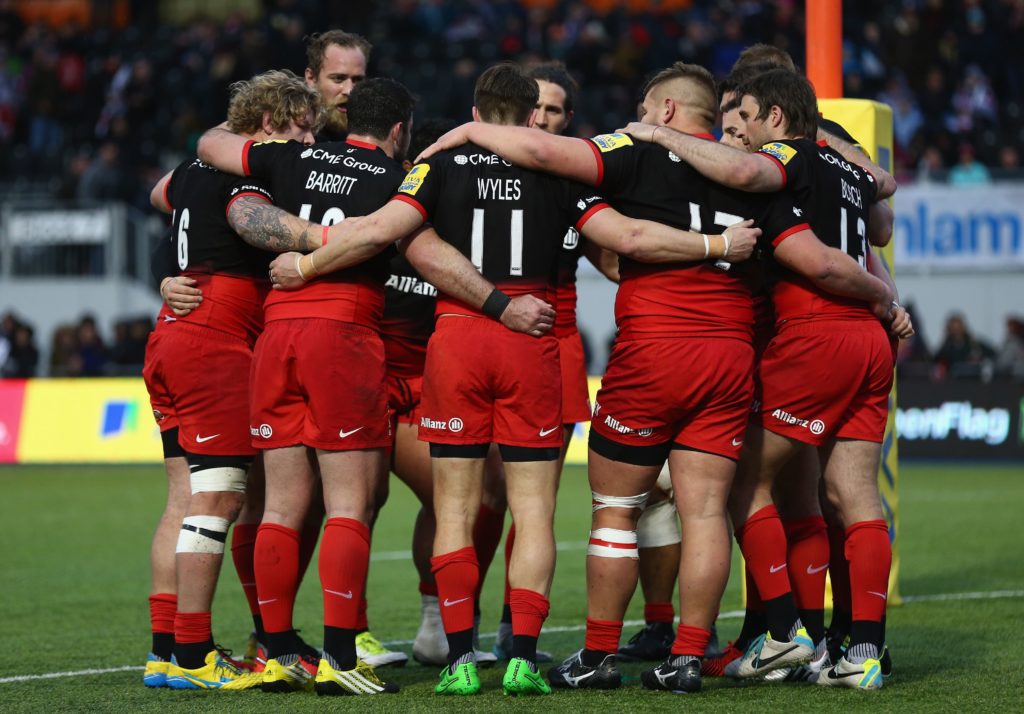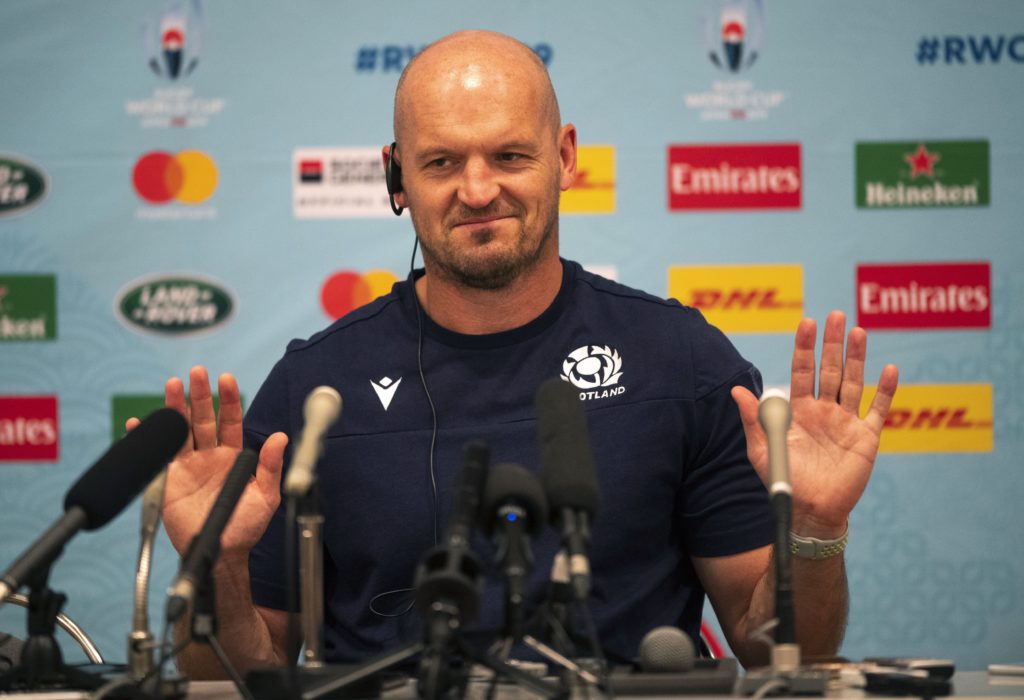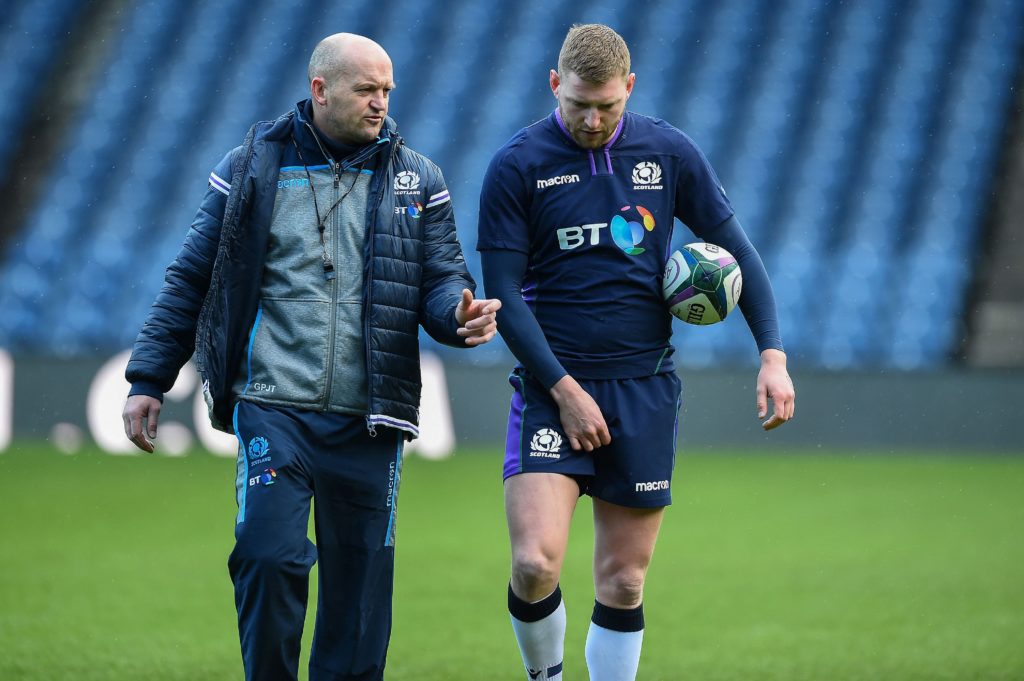For most problems a player encounters, solutions are at their fingertips. If injured, there is a deep pool of resources to make them well again. If they want to work on left-shoulder tackling, drill into the minutiae of an opposition game plan or address their lack of ankle mobility, any number of specialists wielding an array of fabulous technology are on hand. There is a reservoir of coaches, conditioners and analysts on each professional staff to answer queries and confront issues.
Professional rugby has long burnt through lavish sums in pursuit of peak physical performance, turning its men and women into sinewy athletic marvels.
But what about matters of the mind? Where does a player turn when their confidence ebbs or their happiness frays? What if the very culture of a team itself is in jeopardy?
Professor Damian Hughes is an expert in organisational psychology, a branch of the science that deals with how people think and act in their place of work. Hughes is best known as the prolific author of books on Sir Alex Ferguson’s Manchester United and Barcelona under Pep Guardiola, podcast host and go-to man in corporate and sporting high-performance affairs.
Townsend is a culture junkie, a colossal sports nerd who gobbles up every morsel he can from every sport under the sun.
One of Gregor Townsend’s first acts as Scotland coach was to bring Hughes into the inner sanctum. Townsend is a culture junkie, a colossal sports nerd who gobbles up every morsel he can from every sport under the sun. Hughes has worked with him to hone the Scottish environment and improve his leadership within it.
“I don’t think it’s a coincidence that if you go into Ferguson’s United, Saracens in recent years – putting the salary cap scandal aside – or the All Blacks, the best teams are investing in this,” Hughes tells The XV. “They don’t see it as a nice thing to have, they see it as essential to what they’re doing and it’s front and centre in their decision-making. Any organisation that wants a sustained period of success needs to start shifting their focus.
“When culture comes into the discussion with any team, they do it in pre-season when they’ve got time and lots of meetings, and the next time they revisit it is when they’ve lost a few games. It’s like a reaction to defeat, ‘Our culture is s**t, we need to fix it’. Players then associate culture as a punishment.
“The best teams say, ‘Culture is front and centre and it never goes away’. Those behaviours dictate whether you’re in the team as much as how you’ve trained and your skill level. When you go to recruit a player, you do so based on how well you feel they will integrate into your culture as much as how well you feel they’ll do a job on the field.

“Developing players to be able to give feedback, recognise and defend the culture is as important as teaching them how to sing the club song. Culture works in tandem with those things rather than being seen as a separate entity. The best organisations get that.”
An hour with Hughes yields all manner of fascinating gems. He begins with something of a cultural taxonomy lesson. Broadly speaking, each sports club can be slotted into one of five distinct categories.
Firstly, there is the dreaded star culture, where the big dogs with the huge egos are fawned over and their outlandish behaviour forgiven.
“I interviewed a coach at Real Madrid a few years ago and he told me that the trouble with the star culture is everyone wants to be the head waiter but nobody wants to wash the dishes,” said Hughes. “Guys in the shadows who do the hard work don’t get acknowledged, so you get a big imbalance and resentment that will fester.”
Then there is the autocratic culture driven by a domineering coach, ‘My way or the highway’. Think Richard Cockerill at Edinburgh, for instance. That can work, but if the coach “goes rogue, they can drag the whole organisation down with them”.
In a bureaucratic culture, stats and metrics reign. This is the ‘Moneyball’ approach. Whereas with an engineering culture, players will be selected so long as they have the skills and profile to fit the team’s specific needs. Personality is irrelevant.
What you really want, says Hughes, is the cultural utopia of a commitment ethos, an ecosystem based on selflessness and mutual investment in a common purpose. Everyone knows what is expected of them and places the team before personal glory. This is what he and Townsend yearn to cultivate.
“We’d spoken about the idea of representing the very best of Scotland to the rest of the world. We’ve got clear trademark behaviour if you want to be part of the set-up and we established that at the start of Gregor’s reign,” said Hughes.
You avoid rules, because they are there to be broken. Behaviours give you guidelines to operate within.
“The first one is bravery – you will make mistakes but how do you face up to them? The second one is that you do everything with high energy, so you don’t slope around. And the third one is that phrase ‘As One’, you do everything for the team and put the team above your own self-interest. These are the non-negotiable behaviours that you have to buy in to.
“You avoid rules, because they are often there to be broken. Behaviours give you guidelines to operate within. You’re not trying to curtail individuality or people expressing themselves, as long as you stress that you do everything with bravery, you do everything with high energy and you put the team above self-interest.
“That’s why behaviours are better than rules – we’re not trying to knock out any of your individual flair, but you are choosing to be part of the team and there are certain behaviours that everyone needs to subscribe to, because that then creates that sense of equality.”
Hughes is there to talk to players individually, impart a sliver of wisdom that makes them think differently about a scenario or challenges their approach to a problem.
Mostly, though, he works directly with Townsend. Players devour messages more readily if they come from a coach, rather than a pontificating psychologist with no great standing in rugby.

He subjects Townsend to a range of techniques, from rehearsing his post-match press conference days before the match takes place to preparing for what Ferguson used to call ‘oh s**t’ moments. In rugby, that might mean standing under your posts three tries down in the opening 10 minutes, or defending your line in a semi-final with two blokes in the sin-bin and a slender lead to protect.
“The intent is to get the ideas into the blood supply of the team and organisation,” says Hughes. “I’m the eyes and ears for the coaching staff, so I’m in the room when they deliver the messages, I can watch the room and see whether anybody needs some of the stuff picking up on.
“I get Gregor to prepare his post-match press conference before the game. You know there are only three outcomes – win, lose or draw – so you should have a plan in place for the week ahead.
“If you stand in front of the cameras and blame the referee or conditions, getting the players to buy in to how they can improve on Monday morning becomes an uphill task. It’s about not responding with emotion, but with a more logical, focused thinking.
“We prepare for ‘oh s**t’ moments but the real impact is going to be the coaches weaving that into their sessions and making sure it’s real life and credible in practice. If you practise those ‘oh s**t ‘moments, you are just sticking with and having faith in your process over and over again, regardless of the occasion. That does come with practice and patience.”
The sorry Russell ordeal did not reflect well on Townsend or the much-vaunted team culture.
Jamie Lyall, The XV
You can’t dissect the Scotland culture without addressing the Finn Russell-shaped elephant in the room. On the eve of the Six Nations camp this year, Russell left the squad hotel after what the national governing body would clumsily refer to as “a breach of team protocol”.
The narrative, well-trodden ground by now, was that the fly-half enjoyed more than the two beers the squad had agreed would be their limit. Russell argued the leadership group – of which he was supposedly a member – set the rule without asking him and said he was irked by several team-mates’ objections to his ordering of a third beverage. In an acidic Sunday Times interview, he said he had no personal relationship with Townsend and even ventured that being in the Scotland camp was bad for his health.
The sorry ordeal did not reflect well on Townsend or the much-vaunted team culture. Hughes cannot discuss the Russell saga specifically but, in general terms, says making exceptions for players, no matter how brilliant, is a fraught dynamic.
“You’ve got to have that balance – you want to have your best players there, but you want everybody buying in to the same principles,” he said. “If somebody chooses not to respect those behaviours, you create ambiguity. Why can he do that, but I can’t?

“If someone walks past Gregor and doesn’t say hello, he doesn’t just put it down to the player having a bad day. Or if it’s a player who is delivering results, he turns a blind eye to that player but challenges the younger player. There is consistency and transparency in how this is applied and it removes subjectivity from a situation like this.
“If you’ve got your coaches laying down the law and they’re the ones upholding it, the danger is that it becomes autocratic. If you can get everyone buying into it, what you really want is the leaders within your playing group upholding and defending it. That’s where the real power of a culture lies.”
The line goes that Scotland have plenty tidy rugby players, but not enough who would steamroll their grannies to score a try. Too many private schoolboys who have never known true hardship or poverty.
These past 18 months have been wounding for Townsend. Scotland lurched from a bleak 2019 Six Nations – enlivened only by a 38-38 draw with England – to a truly heinous World Cup exit in the group stages following defeats by Ireland and Japan.
The line goes that Scotland have plenty tidy rugby players, but not enough who would steamroll their grannies to score a try. Too many private schoolboys who have never known true hardship or poverty. It is not that Townsend needed to unearth a few more street urchins, but that his team want for unbridled, confrontational snarl.
“I think it’s a fair perception,” says Hughes. “Every great team have got that bit of grit, somebody who says we will find a way to win and we’ll get through it. Some of that does come through life experiences.
“I remember talking to Jamie Bhatti and he could tell me how many cows he’d slaughtered – that was chilling but brilliant, he knew he didn’t want to go back there.”

Hughes also warns of the perils of rifling through coaches in a quest to reach the top. A cannier, nastier Scotland emerged in the Covid-19-ravaged Six Nations, suggesting lessons had been learnt and game plans enriched by the horrors of Japan.
“The World Cup experience was disappointing, there’s no way around that, but are Gregor and the people around him better coaches for it? Absolutely,” said Hughes. “The intellectual capital they possess having gone through that make them even better coaches. I was really glad Scottish Rugby saw that long-term perspective.
“When writing a book on Sir Alex Ferguson, I met some of the people who were involved in the decision-making at Manchester United. I asked them, ‘Why did you stay faithful to him over the five years where he didn’t win anything?’
“They said if they’d have sacked him, whoever they’d have brought in would have gone and put their energy in the same places. He was identifying the problems and fixing them. To have brought somebody else in, they’d only have had to fix those same issues. So many decision-makers get caught in that short-term cycle.
“Can you see seeds of progress with Scotland? Definitely. That game against Ireland in Dublin at the start of the Six Nations, there were moments where you thought, ‘This is nearly coming, we’re nearly on the cusp’. We are moving in the right direction and when you’re objective, you can see that happening.”
Scotland’s rugby is evolving, and so is their culture.
If you’ve enjoyed this article, please share it with friends or on social media. We rely solely on new subscribers to fund high-quality journalism and appreciate you sharing this so we can continue to grow, produce more quality content and support our writers.



Comments
Join free and tell us what you really think!
Sign up for free